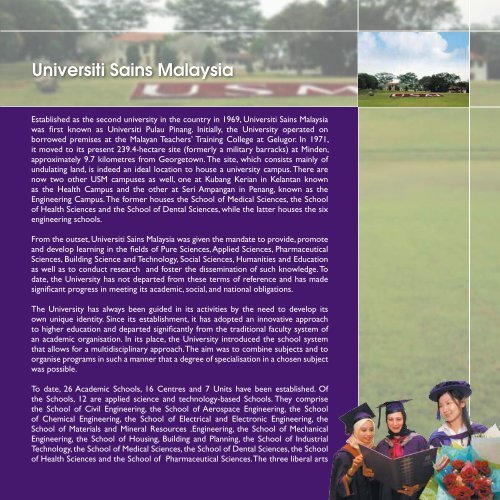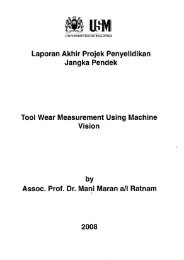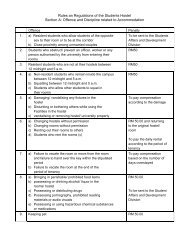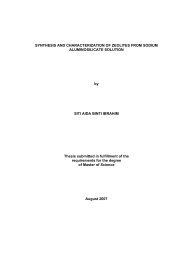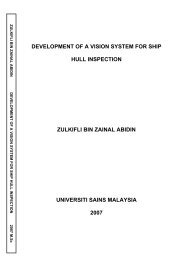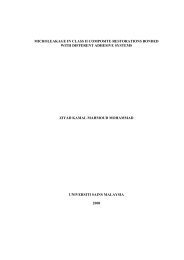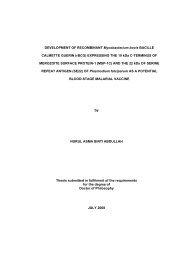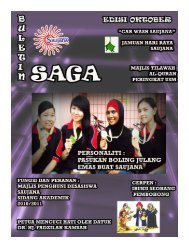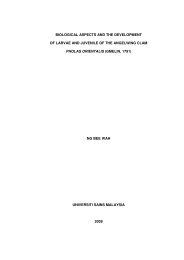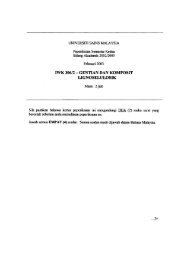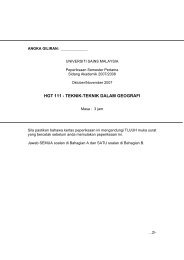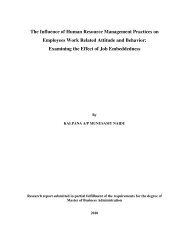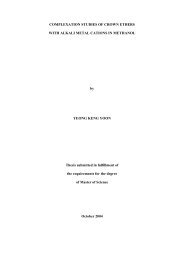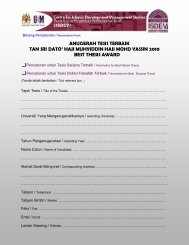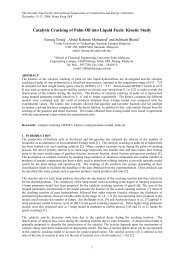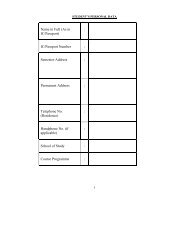You also want an ePaper? Increase the reach of your titles
YUMPU automatically turns print PDFs into web optimized ePapers that Google loves.
<strong>Universiti</strong> <strong>Sains</strong> <strong>Malaysia</strong><br />
Established as the second university in the country in 1969, <strong>Universiti</strong> <strong>Sains</strong> <strong>Malaysia</strong><br />
was first known as <strong>Universiti</strong> Pulau Pinang. Initially, the University operated on<br />
borrowed premises at the Malayan Teachers’ Training College at Gelugor. In 1971,<br />
it moved to its present 239.4-hectare site (formerly a military barracks) at Minden,<br />
approximately 9.7 kilometres from Georgetown. The site, which consists mainly of<br />
undulating land, is indeed an ideal location to house a university campus. There are<br />
now two other USM campuses as well, one at Kubang Kerian in Kelantan known<br />
as the Health Campus and the other at Seri Ampangan in Penang, known as the<br />
Engineering Campus. The former houses the School of Medical Sciences, the School<br />
of Health Sciences and the School of Dental Sciences, while the latter houses the six<br />
engineering schools.<br />
From the outset, <strong>Universiti</strong> <strong>Sains</strong> <strong>Malaysia</strong> was given the mandate to provide, promote<br />
and develop learning in the fields of Pure Sciences, Applied Sciences, Pharmaceutical<br />
Sciences, Building Science and Technology, Social Sciences, Humanities and Education<br />
as well as to conduct research and foster the dissemination of such knowledge. To<br />
date, the University has not departed from these terms of reference and has made<br />
significant progress in meeting its academic, social, and national obligations.<br />
The University has always been guided in its activities by the need to develop its<br />
own unique identity. Since its establishment, it has adopted an innovative approach<br />
to higher education and departed significantly from the traditional faculty system of<br />
an academic organisation. In its place, the University introduced the school system<br />
that allows for a multidisciplinary approach. The aim was to combine subjects and to<br />
organise programs in such a manner that a degree of specialisation in a chosen subject<br />
was possible.<br />
To date, 26 Academic Schools, 16 Centres and 7 Units have been established. Of<br />
the Schools, 12 are applied science and technology-based Schools. They comprise<br />
the School of Civil Engineering, the School of Aerospace Engineering, the School<br />
of Chemical Engineering, the School of Electrical and Electronic Engineering, the<br />
School of Materials and Mineral Resources .Engineering, the School of Mechanical<br />
Engineering, the School of Housing, Building and Planning, the School of Industrial<br />
Technology, the School of Medical Sciences, the School of Dental Sciences, the School<br />
of Health Sciences and the School of Pharmaceutical Sciences. The three liberal arts
schools are the School of Educational Studies, the School of Humanities and the<br />
School of Social Sciences. The pure science schools comprise the School of Biological<br />
Sciences, the School of Chemical Sciences, the School of Mathematical Sciences, the<br />
School of Computer Sciences, and the School of Physics, all of which offer courses<br />
that are similar to those traditionally available in other universities.<br />
In December 1989, the School of Management was set up, having evolved from<br />
the Management programme within the School of Social Sciences. As part of its<br />
expansion, the University established the School of Computer Sciences and the School<br />
of Communication as of March 1995. In November 2008, the School of Languages,<br />
Literacy and Translation was formally established.<br />
The centres and ancillary services provided by the university include the National<br />
Poison Centre, the Doping Control Centre, the Centre for Archeological Research<br />
<strong>Malaysia</strong>, the Centre for Educational Technology and Multimedia, the Computer<br />
Centre, the Centre for Knowledge, Communication, and Technology and the Islamic<br />
Centre. There are also various research centres, namely the Centre for Policy<br />
Research, the Centre for Drug Research and the Centre for Marine and Coastal<br />
Studies. The Distance Education Programme offered through the School of Distance<br />
Education is another innovative programme adopted by the University in 1971. It has<br />
gained encouraging response from working adults and is set to be developed further<br />
in this decade to cater for new needs and demands.<br />
In the field of research, the emphasis is on function-oriented or interdisciplinary<br />
research. The focus is on areas that integrate academic interest and practical relevance,<br />
thus directing scientific thrusts towards breakthroughs in problem areas crucial to the<br />
quality of life and national development.<br />
In 2008, the Ministry of Higher Education formally selected <strong>Universiti</strong> <strong>Sains</strong> <strong>Malaysia</strong><br />
to participate in the Accelerated Programme for Educational Excellence (APEX). This<br />
selection was based on a rigourous evaluation of the capabilities and preparedness<br />
of local public universities to attain world class status within the shortest period of<br />
time. The assessment revealed that <strong>Universiti</strong> <strong>Sains</strong> <strong>Malaysia</strong> with its innovative and<br />
constantly evolving curricula, its comprehensive transformational plan and its emphasis<br />
on providing quality education within a sustainable teaching and learning paradigm was<br />
the most suited and prepared public university to attain a top 100 ranking within the<br />
foreseeable future. USM is indeed honoured and proud to be the first university to<br />
be selected for this programme yet it is also aware of the tremendous responsibility<br />
and trust placed upon it by the Government of <strong>Malaysia</strong> to realize the Government’s<br />
cherished aspiration of having world class universities in the country that will further<br />
enhance the nation’s stature as an educational hub.
The Undergraduate Programme<br />
Almost all undergraduate degree programmes at the University require a minimum<br />
full-time study period of three years. Degrees in computer science, management,<br />
education, accountancy, food technology, engineering, health sciences (e.g. forensic<br />
science) pharmacy, medicine, and dentistry, however, require minimum periods of<br />
study of between four and five years. Graduates from the Housing, Building and<br />
Planning programme may apply to continue their studies in Architecture, which leads<br />
to a Bachelor’s degree after an additional two years of study. For <strong>Malaysia</strong>n students,<br />
degrees in the pure sciences, humanities, social sciences, and management may also<br />
be pursued through the distance education programme. These degrees require a<br />
minimum study period of four years. Each academic year consists of two semesters,<br />
and in order to graduate, students must accumulate the required number of credit<br />
units. All the Schools, with the exception of the School of Medical Sciences and the<br />
School of Dental Sciences, currently follow this system.<br />
Courses for all undergraduate degree programmes are conducted through classroom<br />
lectures, tutorials, practicals, fieldwork, seminars, and workshops. The courses are<br />
further classified into core-compulsory, core-required, elective, and optional courses.<br />
Courses in Bahasa <strong>Malaysia</strong> (Malay Language) and English Language are graduation<br />
requirements for all undergraduate students.<br />
A course may be a prerequisite to, sequential to, or concurrent with another course.<br />
Courses are coded in ascending levels, viz. Levels 100, 200, 300, and 400. Examinations<br />
are held at the end of each semester and students are required to reach a satisfactory<br />
standard of performance before they are permitted to continue their studies in the<br />
following semester, failing which, they are placed on probation. A student can only<br />
remain on probation for a maximum of three consecutive semesters. Students failing<br />
core-compulsory courses must repeat them until they pass the courses concerned.<br />
Students may also audit courses for self-enrichment purposes and may also sit for<br />
examinations in them, but the marks/grades obtained, do not contribute towards the<br />
credit units required for graduation. Students may major in one subject, or enroll in a<br />
major-minor programme.
Admission To The University<br />
The university admits suitably qualified <strong>Malaysia</strong>n citizens into its degree programmes.<br />
A small number of places are also allocated for foreign students. Applications for<br />
admission will be processed by the University itself. As a general admission requirement,<br />
the applicant must possess the <strong>Malaysia</strong>n Certificate of Education with a credit in<br />
Bahasa <strong>Malaysia</strong> (Malay Language). In addition, the candidate must possess a <strong>Malaysia</strong>n<br />
Higher School Certificate or a Matriculation Certificate, a Diploma, or any equivalent<br />
qualifications with a minimum grade B (3.00) for science’s based programme and<br />
grade B- (2.67) for art’s based programme, in three subjects including General Studies<br />
and obtain a Band 1 in the <strong>Malaysia</strong>n University English Test (MUET). Other minimal<br />
entry prerequisites are subject to the requirements of the respective schools.<br />
Admission of International Students into a Full-time Undergraduate Programme<br />
In line with the move towards internationalisation, the University has with effect from<br />
the 1998/99 Academic Session, made available a limited number of places to non-<br />
<strong>Malaysia</strong>n citizens to undertake undergraduate courses on a full-time basis with the<br />
aim of earning USM degrees in selected disciplines. Interested candidates can apply<br />
directly to the Deputy Registrar, Admissions & Enrolments, Academic Management<br />
Division for the prescribed forms, fee schedule, and other related materials. As a<br />
general admission requirement, the applicant must complete 12 years of primary<br />
and high school education and must posess a High School Certificate or a diploma<br />
in the related field. At present, the following degree programmes are offered to<br />
international students:<br />
Bachelor of Accounting<br />
Bachelor of Architecture<br />
Bachelor of Arts<br />
English Language & Literature Studies<br />
Bachelor of Arts [Humanities]<br />
English Language Studies History<br />
Geography Literature<br />
Malay Language Studies Translation and Interpretation
Bachelor of Communication<br />
Film and Broadcasting Persuasive Communication<br />
Journalism<br />
Bachelor of Computer Sciences<br />
Distributed Systems & Security Information Systems Engineering<br />
Intelligent Systems Multimedia Computing<br />
Network Computing Software Engineering<br />
Bachelor of Education<br />
Arts with Education Education [Special Education]<br />
Education [TESOL] Science with Education<br />
Bachelor of Fine Arts<br />
Acting & Directing Communication Graphics<br />
Fine Arts New Media Design and Technology<br />
Performance and Pedagogy Product Design<br />
Bachelor of Industrial Technology<br />
Food Bioprocess<br />
Bio-Resource, Paper and Coatings Environment<br />
Bachelor of Management<br />
Finance International Business<br />
Marketing Operations<br />
Organisation<br />
Bachelor of Science<br />
Animal Biology Microbiology<br />
Plant Biology<br />
Bachelor of Applied Science [Biology]<br />
Agrobiology Aquatic Biology<br />
Biotechnology Biology & Management of Vector & Parasites<br />
Environmental Biology<br />
Bachelor of Science<br />
Chemistry<br />
Bachelor of Applied Science [Chemistry]<br />
Analytical Chemistry Industrial Chemistry
Bachelor of Science [Housing, Building and Planning]<br />
Architecture Building Technology<br />
Construction Management Interior Design<br />
Quantity Surveying Urban and Regional Planning<br />
Bachelor of Science<br />
Mathematics<br />
Bachelor of Applied Science [Mathematics]<br />
Applied Statistics Mathematics and Economics<br />
Mathematicals Modelling<br />
Bachelor of Science<br />
Physics<br />
Bachelor of Applied Science [Physics]<br />
Applied Physics Geophysics<br />
Medical Physics Engineering Physics<br />
Bachelor of Social Science<br />
Anthropology and Sociology Planning & Development Management<br />
Economics<br />
Social Work<br />
Political Science<br />
All enquiries are welcome and should be sent to the Admissions & Enrolments Unit of<br />
the Registry Department. Alternatively, relevant information can be sourced through<br />
the USM Homepage, at http://www.usm.my.<br />
Undergraduate courses are taught in Bahasa <strong>Malaysia</strong> and English. As such, international<br />
students will have to demonstrate a level of proficiency in the national language as<br />
part of the entrance selection criteria. Prospective candidates who are not sufficiently<br />
proficient in Bahasa <strong>Malaysia</strong> will be required to undergo a preparatory<br />
intensive Malay Language programme of one year prior to admission<br />
into the undergraduate degree course. This course is offered in<br />
June each year.
Undergraduate Programme Structure<br />
Bachelor of Applied Science with Honours<br />
[B.App.Sc. (Hons.)]<br />
The Bachelor of Applied Science with Honours is a three-year degree programme jointly<br />
offered by the four Pure Science Schools to produce graduates in the various fields of<br />
applied science. In their first year, students are required to take basic courses related<br />
to their major disciplines, which are Applied Physics, Geophysics, Analytical Chemistry,<br />
Industrial Chemistry, Entomology, Aquatic Biology, Biotechnology, Environmental Biology,<br />
Parasitology, Plant Pathology, Applied Statistics and Operations Research, Mathematics,<br />
Engineering Physics and Medical Physics. In the subsequent years, students major in<br />
their chosen disciplines and minor in any one of the other science disciplines. There is,<br />
however, an exception to this, wherein a student may opt for a double-major programme<br />
in Mathematics and Economies (where Economics is offered through the School of<br />
Social Sciences). Courses offered are graded into three levels, viz levels 100, 200 and<br />
300. In order to obtain a Bachelor’s degree in Applied Science, students must accumulate<br />
105 credit units and fulfil all other relevant University requirements.<br />
Bachelor of Arts with Honours<br />
[B.A. (Hons.)]<br />
The Bachelor of Arts with Honours is a three-year degree programme offered by the<br />
School of Humanities. In the introductory year, students register for four foundation<br />
courses in disciplines like Bahasa <strong>Malaysia</strong>, English Language, Fine Arts, Geography,<br />
History, Islamic Studies, Literature, Music, Philosophy, and Performing Arts. In addition,<br />
the students must pass a course in Critical Thinking. Students are also encouraged to<br />
participate in the activities of uniformed bodies, sports, community service or cultural<br />
activities. After completing the introductory courses, the students major in one and<br />
minor in another of the above- mentioned disciplines. Islamic and Asian Civilizations<br />
is a compulsory course in the second year of study. In the final year, students continue<br />
with their subjects of specialisation. The graduation requirement is 100 credit units.<br />
Bachelor of Arts with Honours<br />
[B.A. (Hons.)] (Translation and Interpretation)<br />
The Bachelor of Arts with Honours in Translation and Interpretation is a three-year<br />
degree programme based on four components:<br />
1. The theoretical aspects of translation and interpretation.
2. The practical aspects of translation and interpretation.<br />
3. Courses that strengthen students’ grasp of the specific subject areas, for example,<br />
Computer Science, Social Sciences, Law etc.<br />
4. Courses that strengthen their command of the source and target languages as well<br />
as linguistic areas, such as morphology, syntax and semantics.<br />
For the purpose of the course, the English Language always serves as the source<br />
language while Bahasa <strong>Malaysia</strong> is the target language. Students are taught to interpret<br />
general texts in the English Language into Bahasa <strong>Malaysia</strong>. Using a range of texts drawn<br />
from legal, literary, scientific, and technical fields, they are also taught techniques of<br />
translating from the English Language into Bahasa <strong>Malaysia</strong> and vice-versa. Students are<br />
introduced to the latest information technology and its use in editing and translating.<br />
Students need to accumulate at least 100 credit units to graduate. In addition, students<br />
majoring in Translation and Interpretation are required to minor in another discipline<br />
such as Communication, Management, Economics, etc.<br />
Bachelor of Arts with Honours<br />
[B.A. (Hons.)] (English Language and Literature Studies)<br />
The Bachelor of Arts with Honours in English Language and Literature Studies (ELLS)<br />
is a three-year degree programme offered by the School of Humanities. It requires 100<br />
credit units for graduation. The ELLS programme consists of:<br />
• A selection of common-core of cross-disciplinary courses, which complements<br />
the mainstream courses as well as provides exposure to, and foundation in, areas<br />
relevant to future occupational and professional needs.<br />
• Major courses, which involve in-depth study of English Language and Literature<br />
in English.<br />
• Minor courses in related disciplines, such as translation, communication, etc. from<br />
the second year onwards.<br />
• An elective programme of five courses from such diverse fields as Computer-<br />
Assisted Language Learning, Report Writing and Editing, Odes and Sonnets, English<br />
for Specific Purposes, Translation Methods, Lexicography and Terminology in<br />
Translation, and New Literatures in English. The Elective programme is to encourage<br />
a broad-based interdisciplinary education.<br />
• University courses in Bahasa <strong>Malaysia</strong>, Writing Skills, Spoken English, and selected<br />
options.<br />
In the foundation and major courses, learning and teaching theories are emphasised. In<br />
addition, students who choose not to do the elective courses may minor in another<br />
discipline, which is usually a teaching subject in the school curriculum. Minor Programmes<br />
comprising 16 units include:<br />
• English Language and Literature<br />
• Translating
• Japanese Language Studies<br />
• Chinese Language Studies<br />
Bachelor of Arts (Education) with Honours<br />
[B.A. (Ed.) Hons.]<br />
The Bachelor of Arts (Education) with Honours is a four-year degree programme. This<br />
programme consists of two main components, viz the academic component offered<br />
by the School of Humanities and the pedagogical component offered by the School<br />
of Educational Studies. For the academic component, students enroll in at least four<br />
introductory courses, and one other course taken from another school, during the<br />
first year. They are required to major in a single school subject and minor in another<br />
subject relevant to the secondary school curriculum. Subjects offered by the School of<br />
Humanities for the major-minor specialisation include Bahasa <strong>Malaysia</strong>, English Language,<br />
Geography, Literature, and History; while the School of Social Sciences and the School<br />
of Management offer Economics and Commerce respectively. For the pedagogical<br />
component, students are not only provided with foundation courses in education<br />
but are also given exposure to methods of teaching the relevant school subject via<br />
a compulsory teaching practice session in schools. Students pursuing this degree are<br />
required to accumulate 130 credit units for graduation.<br />
Bachelor of Arts with Honours<br />
[B.A (Hons.)] English for Professionals<br />
The Bachelor of Arts (English for Professionals) with Honours is a three-year degree<br />
programme offered by the School of Languages, Literacies and Translation which<br />
requires 110 credit units for graduation. The range of topics in the foundation and<br />
major courses have been created to provide a balance between theoretical content<br />
and practical language skills. This programme is designed to help undergraduates to<br />
develop and acquire:<br />
• theoretical knowledge and principles necessary for understanding the structure<br />
and use of the English language;<br />
• the ability to use the knowledge of the English Language (syntext, lexis, pragmatics)<br />
for academic purposes (report writing, project work, etc.).<br />
• interpersonal skills, critical thinking skills and problem-solving abilities to contribute<br />
meaningfully to a changing international environment; and,<br />
• a broad range of professional registers in English appropriate for interaction with<br />
employers and colleagues in a variety of work related situations.<br />
In addition, students may choose to minor in another discipline from the various Minor<br />
Programmes comprising a minimum of 16 units that are offered by the other Schools.
Bachelor of Science (Education) with Honours<br />
[B.Sc. (Ed.) Hons.]<br />
The Bachelor of Science (Education) with Honours is a four-year degree programme.<br />
The programme comprises two main components, viz the academic component<br />
offered by the Schools of Biological Sciences, Chemical Sciences, Mathematical Sciences,<br />
Computer Sciences and Physics, and the pedagogical component by the School of<br />
Educational Studies. For the academic component, students major in one of the four<br />
science disciplines, which are Physics, Chemistry, Biology and Mathematics, and minor<br />
in another subject from the above. Several arts subjects are also offered as minors.<br />
The pedagogical component includes a compulsory teaching practice session. Students<br />
pursuing this degree are required to accumulate 130 credit units for graduation.<br />
Bachelor of Communication with Honours<br />
[B.Comn. (Hons.)]<br />
The Bachelor of Communication with Honours is a three-year degree programme,<br />
designed to incorporate the various theoretical and practical dimensions of communication<br />
and media studies. In the first year, students take communication courses which are<br />
aimed at orienting them to the fundamentals of communication, including theory,<br />
research, technology and culture. In the second year, students choose one of four<br />
communication subjects for specialization. They comprise journalism, film, television,<br />
and persuasive communication. At the end of the third year, students are placed in a<br />
communication organisation to undergo five months of industrial training. The training<br />
exposes the students to and prepares them for professional work situations. Students<br />
are required to accumulate 105 credit units for graduation.<br />
Bachelor of Computer Science with Honours<br />
[B.Comp.Sc. (Hons.)]<br />
The Bachelor of Computer Science with Honours is a four-year programme offered<br />
by the School of Computer Sciences which encompasses all aspects of computing as a<br />
discipline. The programme covers theoretical and scientific foundations as well as various<br />
extensive applications in industry and commerce. The curriculum of the programme<br />
emphasizes problem-based learning concepts in particular through practical/project/<br />
training-based courses that are integrated throughout the years, and emphasises as<br />
well as inculcates a research orientation to the students.<br />
In the first year, students are taught the basics of Computer Science such as algorithms<br />
and problem solving, programming techniques using a high level language, data structures,<br />
computer organisation and a strong foundation in mathematics and logic. Year II and<br />
Year III offer an integrated and a wide range of courses that focus on a variety of areas<br />
in computing that allow students to specialise in a specific area namely:<br />
• Intelligent Systems<br />
• Software Engineering<br />
• Information Systems Engineering
• Multimedia Computing<br />
• Network Computing<br />
• Distributed Systems & Security<br />
Second year topics also include common core courses namely operating systems, data<br />
communication, programming language concepts and paradigms, algorithms, database<br />
organisation, and system analysis and design. Practical and project based courses namely<br />
integrated software development, group minor project and research methods and<br />
special topics on the specialisation area are also offered.<br />
During the second semester and the long vacation of the third year students will be<br />
assigned to various organisations for a full time industrial training for a period of six<br />
months. In the final year, students will be taking other advanced courses to enhance<br />
their field of specialisation that focuses on the main research activities of the school.<br />
Students are also required to complete a major project during the fourth year under<br />
the supervision of at least one academic staff and to undertake a course on professional<br />
and technoprenuership development.<br />
The specialisation areas together with the common core courses have been carefully<br />
designed to ensure that graduates will have the widest choice in their later careers in<br />
business, industry, public sector, research and education, occupying a variety of positions<br />
such as System Analyst, Analyst/Programmer, System Engineer, System Programmer, System<br />
Administrator, Software Engineer, Information Systems/Information Technology Officer,<br />
Software Project Manager, Software Quality Officer, Knowledge Engineer, Information<br />
Systems Project Manager, Multimedia Project Manager, Information Research Manager,<br />
Information Systems Manager, Database Administrator, Network Manager, Network<br />
Engineer and Research Officer.<br />
Bachelor of Education with Honours<br />
[B.Ed. (Hons.)]<br />
The Bachelor of Education with Honours degree programme consists of two main<br />
components, viz the academic component offered by the four pure science schools<br />
and the School of Humanities, and the pedagogical component offered by the School<br />
of Educational Studies. For students majoring in Preschool and Special Education<br />
(Professional), the minor component will be from the pure science school or the<br />
School of Humanities. Under the academic component, students are required to take<br />
courses in the Sciences or Humanities as well as to study, for exposure, a particular area<br />
in a discipline outside the Sciences and Humanities. For the pedagogical component,<br />
students are required to read foundation courses in education and courses on methods<br />
of teaching in the relevant school subjects. In addition, they have to choose an area of<br />
specialisation in education in the form of a minor package consisting of five courses.<br />
Teaching practice and practical sub-components are compulsory. Students pursuing<br />
this degree programme must accumulate 130 credit units for graduation.
Bachelor of Engineering with Honours<br />
[B.Eng. (Hons.)]<br />
The six engineering Schools at the Engineering Campus offer courses in their respective<br />
thrust areas, which are Electrical and Electronic Engineering, Electrical Power Engineering,<br />
Materials Engineering, Mineral Resources Engineering, Civil Engineering, Mechanical<br />
Engineering, Chemical Engineering, Manufacturing Engineering and Management, and<br />
Aerospace Engineering leading to a common Bachelor’s degree in Engineering. Students<br />
are exposed to the basic engineering sciences and to their relevant disciplines from<br />
the first year. In subsequent levels, their curriculum contains an increasingly larger<br />
proportion of courses relevant to their specialisation.<br />
Students are required to undergo seven weeks of in-house practical training and a<br />
minimum of ten weeks of industrial training at the end of the second year. Students<br />
must accumulate at least 135 credit units for graduation.<br />
Bachelor of Management with Honours<br />
[B.Mgmt. (Hons.)]<br />
The Bachelor of Management with Honours is a four-year degree programme. The first<br />
half of the programme is devoted to basic analytical tools and general management<br />
courses. The final year of the programme focuses on specialised management areas.<br />
Students in the second year may elect to major in Finance, Marketing, Operational<br />
Management or Organisational Management and International Business. Bahasa <strong>Malaysia</strong><br />
and English Language courses are compulsory. The course on Islamic Civilisation is<br />
compulsory for all students.<br />
Co-curricular activities, totaling a maximum of 3 credit units, may also be taken. Students<br />
are required to accumulate 136 credit units for graduation.<br />
Bachelor of Accounting<br />
[B.Acc. (Hons.)]<br />
The Bachelor of Accounting is a four-year professional degree programme, which<br />
incorporates various theoretical and practical dimensions of accounting, IT and<br />
business. The curriculum was designed in consultation with the <strong>Malaysia</strong>n Institute of<br />
Accountants (MIA) and was evaluated by practitioners, renowned accounting professors<br />
and the <strong>Malaysia</strong>n Association of Certified Public Accountants (MACPA). To ensure the<br />
professional climate of the programme, practicing accountants will also be participating<br />
in the teaching of selected courses. Upon the completion of the degree, students are<br />
required to gain 3 years of working experience after which they are eligible to apply<br />
for professional membership.<br />
Student is required to accumulate 139 credit units for graduation. In the first year,<br />
students enrol in foundation courses. This prepares them for the problem-oriented<br />
accounting, finance and management courses in the second and the third year.
Where possible, the courses are designed to provide the students with ‘hands-on’<br />
experience in using various accounting software. This is to equip them with the<br />
necessary IT skills to enable them to work in a near ‘paperless’ world with much<br />
emphasis towards electronic transactions.<br />
The USM accounting programme intends to supply the nation with high calibre<br />
accountants, knowledgeable in the field of accounting as well as equipped with IT<br />
knowledge and management skills. It is envisaged that this initiative will enable the<br />
country to achieve the number of accountants needed to achieve Vision 2020.<br />
Doctor of Dental Surgery (D.D.S.)<br />
The School of Dental Sciences, established in 1998, offers an undergraduate degree<br />
programme, namely the Doctor of Dental Surgery (DDS). The School has adopted an<br />
integrated problem-based and problem-solving medical education programme using the<br />
‘organ-system’ approach. The curriculum is designed to offer three phases of study over<br />
a period of five years. The first year (Phase 1) is to lay the foundation for the problembased<br />
course that is undertaken in the second phase of the dental course. The course<br />
provides an understanding of the structure and function of man, his responses to injury,<br />
growth and development, with emphasis on and relevance to the oral environment,<br />
his role in the community, an introduction to clinical studies and a structured first-aid<br />
course. The relevant materials are taught in a series of four core topics: First Aid and<br />
Nursing Courses, The Normal Human Being, Tissue Response, Community Medicine<br />
and Dentistry, Oral Biology and Behavioural Sciences.<br />
Phase II (years 2 and 3) consists of a course in clinical sciences formulated on a<br />
problem-based learning approach. The aim is to integrate the teaching of the basic<br />
Medical and Dental Sciences with that of clinical sciences and thereby provide a<br />
scientific understanding of the disease systems of the body and its impact on the oral<br />
cavity. Clinical relevance is maintained throughout the course. Included are the following<br />
systems: Cardiovascular, Respiratory, Genitouring, Gastrointestinal, Endocrine, Nervous,<br />
Hematology, Reproductive, Musculoskeletal, Psychological Medicine, Communicable<br />
Diseases, Dental Biotechnology, Dental Restorative and Head & Neck Block.<br />
An important Introductory General Block precedes these teaching blocks where the<br />
foundation of clinical sciences, communication skills and bioethics are taught. The main<br />
clinical work is in the form of bedside clinical teaching and dental chair side clinical<br />
teaching following a satisfactory level of competence shown in the dental preclinical<br />
skills laboratory. The emphasis is on acquiring basic clinical examination skills of the<br />
various organ systems and a high level of competence in oro-facial and head & neck<br />
examination, diagnosis and treatment planning. Electives either confer experiential<br />
learning of broad-based societal needs, or generate in-depth scientific investigative<br />
work within departments.
The Community and Family Case Study (CFCS) is a fully integrated School programme<br />
which runs through Phases I, II and III. It provides the students with experiential learning<br />
in the holistic approach to patient care within the community emphasising oral health<br />
as an integral part of general health. Although students are exposed to general clinical<br />
work from the first year, the more senior years are dedicated to dental and oral clinical<br />
teaching, i.e. during Phase III (years 4 and 5).<br />
The aim of this clinical course is to allow students to develop competence in dental<br />
and oral clinical practice and an orientation to Community Service based on the oral<br />
care delivery services of both the teaching hospital and the network of the supporting<br />
hospitals in the district. The aim is to inculcate a sense of professional responsibility<br />
and adaptability towards oral health issues of the community and to independently<br />
design approaches for their resolution. The elective programme of the School offers a<br />
varied spectrum of courses aimed at promoting individual interests beyond the scope<br />
of the dental curriculum, inculcating interest in community services, providing avenues<br />
for research-oriented interests, facilitating personal advancement as well as providing<br />
remedial periods for slow learners. The elective course in the fourth year is compulsory<br />
for dental students who have performed satisfactorily in their core curriculum subjects<br />
and the students are given the liberty to choose their subjects of interest either by<br />
themselves or on the advice of staff. Students are encouraged to design their electives<br />
individually or in pairs. Optional electives are also available for those interested in<br />
pursuing their interests during the vacation. These courses are designed to promote a<br />
continuing interest in subjects outside the core structure of the dental course.<br />
Doctor of Medicine (M.D.)<br />
The School of Medical Sciences, <strong>Universiti</strong> <strong>Sains</strong> <strong>Malaysia</strong>, has adopted an integrated<br />
problem-based and problem-solving medical education programme using the ‘organsystem’<br />
approach. The curriculum is designed to offer three phases over a period of<br />
five years. The first year (Phase 1) is to lay the foundation for the problem-based course<br />
that is undertaken in the second phase of the medical course. The course provides an<br />
understanding of the structure and function of man, his responses to injury, growth<br />
and development, his role in the community, an introduction to human relationship,<br />
his behaviour and emotions, an introduction to clinical studies and a structured firstaid<br />
course. The relevant materials are taught in a series of four core topics: First Aid<br />
and Nursing Courses, The Normal Human Being, Tissue Response, and Community<br />
Medicine and Behavioural Sciences. Phase II (years 2 and 3) consists of a course in clinical<br />
sciences formulated on problem-based learning. The aim is to integrate the teaching of<br />
the basic medical sciences with that of clinical sciences and thereby provide a scientific<br />
understanding of the disease systems of the body. Clinical relevance is maintained<br />
throughout the course. Included are the following systems: Cardiovascular, Respiratory,<br />
Genitourinary, Gastrointestinal, Endocrine, Nervous, Hematology, Reproductive,<br />
Musculoskeletal, Psychological Medicine, and Communicable Diseases.
An important introductory General Block precedes these teaching blocks where the<br />
foundation of clinical sciences, communication skills, and bioethics are taught. The main<br />
clinical work is in the form of bedside clinical teaching. The emphasis is on acquiring<br />
basic clinical examination skills of the various organ systems. Electives either confer<br />
experiential learning of broad-based societal needs, or generate in-depth scientific<br />
investigative work within departments.<br />
The Community and Family Case Study (CFCS) is a fully integrated School programme<br />
which runs through Phases I, II and III. It provides the students with experiential learning<br />
in the holistic approach to patient care within the community. Although students are<br />
exposed to clinical work from the first year, considerable emphasis is given to the<br />
acquisition of this skill in the last two years of the medical course, i.e. during Phase III<br />
(years 4 and 5). The aim of this clinical course is to allow students to develop competence<br />
in clinical practice, and an orientation to Community Service based on the health care<br />
delivery services of both the teaching hospital and the network of the supporting<br />
hospitals in the district. The aim is to inculcate a sense of professional responsibility<br />
and adaptability towards health issues of the community and to independently design<br />
approaches for their resolution. The elective programme of the School offers a varied<br />
spectrum of courses aimed at promoting individual interests beyond the scope of<br />
the medical curriculum, inculcating interest in community services, providing avenues<br />
for research-oriented interests, facilitating personal advancement as well as providing<br />
remedial periods for slow learners.<br />
The elective course in the fourth year is compulsory for students who have performed<br />
satisfactorily in their core curriculum subjects and the students are given the liberty<br />
to choose their subjects of interest either by themselves or on the advice of staff.<br />
Students are encouraged to design their electives individually or in pairs.<br />
Optional electives are also available for those interested in pursuing their interests<br />
during the vacation. These courses are designed to promote a continuing interest in<br />
subjects outside the core structure of the medical course.<br />
Bachelor of Pharmacy with Honours<br />
[B Pharm. (Hons.)]<br />
A candidate for the degree of Bachelor of Pharmacy is required to accumulate a total<br />
of 143 credit units from core courses, electives and optional courses to graduate. The<br />
elective courses cover certain aspects of the core component and the School itself<br />
offers these. Other Schools such as the School of Communication and the School of<br />
Social Sciences offer optional courses in mass communication, economics, sociology,<br />
and management. Final year students pursue courses in clinical pharmacy and<br />
take part in clinical discussions at the hospital. The professional courses come<br />
under one of the disciplines of Pharmaceutical Chemistry, Pharmaceutical<br />
Technology, Physiology, Pharmacology, and Clinical Pharmacy. At levels 200<br />
and 300, students receive their practical training in community pharmacy/
industry during the long vacation, for a period of one week. Level 400 pharmacy students<br />
are attached to community pharmacists for 2 weeks, during their mid-semester break.<br />
Bachelor of Science with Honours<br />
[B.Sc. (Hons.)]<br />
The four Pure Science Schools, which are the Schools of Biological Sciences, Chemical<br />
Sciences, Mathematical Sciences and Physics, jointly offer the Bachelor of Science with<br />
Honours degree programme. Students can choose the major-minor stream (e.g. Major:<br />
Mathematics, Minor: Management) or the Major - Elective stream). In this three-year<br />
programme, a student has to accumulate 100 credit units for graduation.<br />
Bachelor of Science (Housing, Building and Planning) with Honours<br />
[B.Sc. (HBP) Hons.] and Bachelor of Architecture [B.Arch.]<br />
The School of Housing, Building and Planning offers two undergraduate degree<br />
programmes, namely the Bachelor of Science (HBP) and the Bachelor of Architecture.<br />
The curriculum of Housing, Building and Planning includes multidisciplines such as<br />
architecture, planning, engineering, applied design, quantity survey and construction<br />
management.<br />
The inter-related courses in Housing, Building and Planning are classified as courses in<br />
Theory and Methodology, studio projects, laboratory projects, practical training and<br />
research. In the second year, students may opt for any one of the major areas of study<br />
comprising Architecture, Building Management, Town & Area Planning, Quantity Survey,<br />
and Interior Decoration.<br />
All students are required to undergo a minimum period of twelve weeks at building<br />
sites as well as do office training after completing level 200. Students need to fulfil 110<br />
credit units to graduate. Those who opt for Architecture and intend to pursue the<br />
two-year course leading to the degree of Bachelor of Architecture are required to<br />
undergo another 12 weeks of practical training in architectural firms.<br />
Bachelor of Social Science with Honours<br />
[B. Soc. Sc. (Hons.)]<br />
Students for the honours degree in Social Sciences do<br />
foundation courses in their first year of study. In the<br />
subsequent years of study, Social Science students<br />
pursue a major in the specialisation programme<br />
of the School of Social Sciences, from<br />
Anthropology/Sociology, Economics,<br />
Social Work, Development Planning<br />
& Management, or Political Science.
Students are also required to choose minors for specialisation from inside or outside<br />
the School. In addition, they need to fulfil other School requirements and obtain 100<br />
credit units for graduation. Practical training is compulsory for students specialising in<br />
Social Work but optional for students in other programmes.<br />
Bachelor of Technology with Honours<br />
[B.Tech. (Hons.)]<br />
The School of Industrial Technology offers four-year degree programme in Food<br />
Technology and three-year degree programmes in Environmental Technology, Bioresource,<br />
Paper and Coating Technology, each leading to the Bachelor of Technology with<br />
Honours degree. Each one of these four programmes has its own distinct curriculum<br />
spread over the three and four years. The first-year courses are natural extensions of<br />
the basic sciences studied at school level, which are chemistry, mathematics, and physics.<br />
These is also some exposure to topics relevant to the students’ area of specialisation.<br />
In subsequent years, there is an increasing proportion of specialised technological<br />
courses in the curriculum.<br />
During the long vacation at the end of the second year, students have to undergo a<br />
minimum of eight weeks of training by attachment to an industry or to a Government<br />
research establishment. In the final year, students have to carry out an industrial-based<br />
research project. Students may elect to follow either the regular or minor programme,<br />
both of which require the students to take basic, core, elective/minor courses and satisfy<br />
other University requirements. The minimum graduation requirement is 110 credit units.<br />
Bachelor of Fine Arts with Honours<br />
[B.F.A. (Hons.)]<br />
The Bachelor of Fine Arts with Honours is a three-year degree programme that offers<br />
two major areas of studies, namely Graphic Communications, and Acting and Directing.<br />
The knowledge and skills obtained help students to prepare themselves for a career<br />
in professional/commercial work, which are related to graphic and visual designs and<br />
performance or theatrical arts. It is also designed to accommodate professional and<br />
commercial or corporate needs in the field of graphic or electronic arts, drama and<br />
theatre.<br />
Major in Graphic Communications<br />
Courses offered in Graphic Communications, are related to computer graphic and<br />
design work, studio practices and theories in visual art. The programme is designed<br />
to provide the necessary knowledge in graphic design and visual skills, either through<br />
manual practice or computer-based work.<br />
Students are trained through various projects, related to graphic art and<br />
computer applications, and visual design techniques. The courses included are:<br />
Introduction to Fine Arts, Design Theories, Drawings, 2- and 3-D Typography,
Visual Communication, Computer Generated Images, Interactive Multimedia, Practical<br />
Training and Art Project. During each semester, students are expected to produce<br />
studio work or visual projects and participate in art displays/exhibitions.<br />
Major in Acting and Directing<br />
This programme offers courses which are suitable for theatre designers, professional<br />
actors, directors or administrators in the area of performing or stage arts. The courses<br />
offered are also designed to accommodate many aspects of acting and directing, and<br />
stage designs, which can be used in TV productions and film industries.<br />
The main area of study for this programme is focused on theoretical frameworks and<br />
studio practices. These include courses such as: Introduction to Drama and Theatre,<br />
Acting and Directing, Traditional Theatres, Children’s Drama and Theatre, Technical<br />
Theatre, Theories and Principles of Theatres, Perception of Art, Western and Eastern<br />
Theatres and Modern <strong>Malaysia</strong>n Theatres, Practical Training and Art Project. Students<br />
are expected to have some theatrical or performance work during their period of study.<br />
Major in New Media Design and Technology<br />
The New Media Design and Technology programme prepares students to pursue careers<br />
in the field of computer-generated imagery for the information and entertainment<br />
industries. The industries produce special effects and animated characters for films;<br />
interactive media for the World Wide Web and for game development, and motion<br />
graphics for broadcast and feature titles. The New Media Design and Technology<br />
department offers an innovative curriculum, professional-level computer facilities, and<br />
a supportive learning environment.<br />
With a strong industry focus, the undergraduate programme allows students to focus<br />
their studies in specific areas such as two-dimensional or three-dimensional character<br />
animation, game development, experimental animation and interactivity or motion<br />
graphics. Each area of concentration builds upon a common set of digital design skills<br />
developed as a logical extension of foundation studies. Students are encouraged to<br />
take electives in other areas.<br />
Major in Product Design<br />
The Product Design course explores the design processes through which a product is<br />
conceived, developed, fabricated, and marketed. Major emphasis allows the student to<br />
work towards acquiring control of the physical and visual constructs of a given concept<br />
allowing the desired content to be fully communicated. Ideations are developed through<br />
drawings and/or models, and then progress to full-size working pieces. The product<br />
design major requires students to attend a broad range classes including Sculpture,<br />
Ceramics, Metals, and Woodwork.
Bachelor of Health Science with Honours<br />
[B.Hlth.Sc. (Hons.)]<br />
The School of Health Sciences offers eight 4-year programmes namely Audiology, Exercise<br />
& Sports Science, Speech Pathology, Biomedicine, Nursing, Dietetics, Medical Radiation<br />
and Forensic Science. Upon completion, graduates are conferred a Bachelor of Health<br />
Science (Biomedicine/Nursing/Dietetics/Medical Radiation/Speech Pathology/Audiology/<br />
Exercise and Sports Science) or a Bachelor of Science (Forensic Science) degree.<br />
Courses offered are designed to equip students with skills in their chosen fields of<br />
specialisation as well as good background knowledge in other aspects of health sciences.<br />
Students are also expected to take 15-20 units of elective courses in areas such as<br />
social health issues, information technology and others to help them become wellrounded<br />
graduates who fit in well in society, and are sensitive to societal obligations<br />
and needs. During the course, they are also attached to relevant institutions in <strong>Malaysia</strong><br />
for practical training and hands-on experience. Students need to accumulate a total of<br />
130-145 (depending on the programme) credit units from core, elective and university<br />
courses to graduate.<br />
Career opportunities are varied and numerous notably in the health, medical and<br />
therapeutic industries, biomedical research, food and nutritional industry, and<br />
pharmaceutics.<br />
Bachelor of Music with Honours<br />
[B.Mus. (Hons.)]<br />
The Bachelor of Music with Honours is a three-year programme. The main area of study<br />
is on aspects of performance and pedagogy in music. Courses are designed for music<br />
practitioners, conductors, technicians, administrators, teachers or professional musicians.<br />
Courses offered include: Introduction to Music, Basic Pedagogy, Theories and Arrangements<br />
of Music, Vocal and Instrumental, Appreciation of Asian, African and the Pacific Music,<br />
Conducting, Score Reading, Composition, <strong>Malaysia</strong>n and Western Music, Western<br />
Ensemble and Instrumental Repertoire.<br />
Throughout the period of study, students are exposed to theoretical frameworks of<br />
music disciplines, and studio practices are emphasised. These provide students with<br />
proper understanding of music as well as to develop students’ competency and skills in<br />
their own area of specialisation. Students of this programme are expected to participate<br />
in all performances/repertoires organised by the Music Section.
Graduate Studies<br />
People sign up for postgraduate studies for different personal reasons. Some do it to<br />
increase their competitiveness in the market while some need it to help them progress<br />
to the next level of their careers. For enthusiastic students, it is another chance for<br />
more holistic learning. For others, postgraduate studies may be the alternative to<br />
competing for jobs in the market.<br />
Regardless of the reason, postgraduate education is gaining more importance by the day<br />
and <strong>Universiti</strong> <strong>Sains</strong> <strong>Malaysia</strong>’s Institute of Postgraduate Studies is poised to spearhead<br />
the university into becoming aworld-class higher education institution.<br />
To make this vision a reality, IPS embarks on a journey playing the role of both the<br />
promoter and advocator for quality postgraduate education that is carefully designed.<br />
Established in November 16, 1991, IPS is currently supported by highly-qualified staff<br />
in 35 schools and centres of excellence located at USM’s three campuses – the Main<br />
Campus in George Town and Engineering Campus in Seri Ampangan, Nibong Tebal in<br />
Penang, and the Health Campus in Kubang Kerian, Kelantan.<br />
Enrolment<br />
USM offers its postgraduate studies in three different modes to suit various study<br />
styles of students – coursework, research mode and mixed mode which incorporates<br />
both research and coursework.<br />
As of October 2009, IPS has enrolled 7,233 students pursuing their postgraduate<br />
studies at the masters and doctoral levels in various programmes and modes. Some<br />
25 percent of them are international students from 50 countries.<br />
Research fields<br />
Research degrees are often stereotyped as the pre-requisite for academician hopefuls.<br />
IPS seeks to introduce a new paradigm on how research programmes should be<br />
perceived by offering a wide range of research topics at USM.<br />
There are 1,517 research fields applicants can select from that are offered at the<br />
university’s 23 schools. For more details, visit www.ips.usm.my.
Tuition Fees<br />
Tuition fees vary from programme to programme and they are divided into two<br />
categories, which are recurring fees per academic semester and non-recurring fees. For<br />
international students, non-recurring fees vary from country to country, as stipulated<br />
by the <strong>Malaysia</strong>n Immigration Authorities. For more details, visit www.ips.usm.my.<br />
Registration<br />
Students can register for postgraduate programmes at USM’s three campuses, depending<br />
on their choice of fields.<br />
• IPS at USM’s Main Campus in George Town – for all programmes except<br />
Engineering,Medicine, Health and Dentistry programmes<br />
• IPS Desk (Registry) at USM’s Seri Ampangan campus in Nibong Tebal, Penang - for<br />
Engineering programmes only<br />
• IPS Desk (Registry) at USM’s Health Campus in Kubang Kerian, Kelantan – for<br />
Medicine,Health and Dentistry programmes only.<br />
During registration, students must settle all fees and produce payment receipts. Students<br />
with scholarships or are under sponsorships must also produce letters or documents<br />
from the respective organisation as proof.<br />
Financial Assistance:<br />
IPS under the roof of USM offers financial assistance to deserving postgraduate students<br />
in the form of awards, teaching assistantships and research assistantships.<br />
For <strong>Malaysia</strong>n students, the Government, in collaboration with the Ministry of Science,<br />
Technology and Innovation (MOSTI), provides fellowships through the University<br />
Postgraduate Research Scheme and the National Fellowship Scheme.<br />
For detailed information of the assistantships and awards mentioned above, please<br />
refer to the table below:<br />
Scheme Master PhD<br />
Graduate Assistant<br />
(Teaching)<br />
RM900.00 RM1,100.00<br />
USM Fellowship Scheme RM1,500.00 RM2,100.00<br />
Vice-Chancellor’s Award - RM3,000.00
In addition, USM also offers assistantships through the Graduate Assistant (Research)<br />
Scheme with various research grants.<br />
For international students from selected countries, the <strong>Malaysia</strong>n Government also<br />
offers scholarships under the <strong>Malaysia</strong>n Technical Cooperation Programmes (MTCP).<br />
The Islamic Development Bank also provides a limited number of financial aids to<br />
international students.<br />
For more details on financial assistance, visit the Ministry of Higher Education website<br />
at www.mohe.gov.my.<br />
IPS Achievements as of 2009<br />
The number of postgraduate students at USM has increase by 1,000 in 2009 compared<br />
to 2008, indicating that postgraduate education is becoming more popular and significant.<br />
The higher enrolment also reflects the increase in the number of research fields<br />
introduced and offered by the university.<br />
To enhance the quality of postgraduate students at USM, IPS has expanded its support<br />
services to students by establishing the Postgraduate Academic Support Services Unit.<br />
This unit advises students on statistical methodology and editorial services to help<br />
improve students’ skills in theses writing.<br />
IPS has also created the Professional Development Unit to coordinate the organisation<br />
of workshops for developing students’ professionalism in conducting researches, as well<br />
as adding value to their capabilities to enable them to face the competitive job market.<br />
To cope with the expanding student population, IPS has also formed the Data and<br />
Records Unit to expedite management of student data and records more efficiently.<br />
In conjunction with the forming of this unit, the Marketing Information and Communication<br />
(MarIC) Unit was also established to manage prompt transmission and circulation of<br />
information to the ever-growing postgraduate student population at USM.
Dean<br />
Prof. Roshada Hashim<br />
Deputy Dean (Academic Affairs)<br />
Assoc. Prof. Abdul Rahman Othman<br />
Contact:<br />
Institute of Postgraduate Studies<br />
<strong>Universiti</strong> <strong>Sains</strong> <strong>Malaysia</strong><br />
11800 USM Penang,<br />
<strong>Malaysia</strong>.<br />
Email : dean_ips@usm.my<br />
Website : http://www.ips.usm.my<br />
Academic Staff
Other Study Programmes<br />
Study Abroad / Exchange Programme<br />
<strong>Universiti</strong> <strong>Sains</strong> <strong>Malaysia</strong> invites students from universities all over the world to<br />
participate in its Study Abroad/Exchange Programme. Students will have the choice<br />
of spending either one semester or one academic year at the University under this<br />
programme. Credit transfer is possible through arrangements with the students’<br />
home institutions. Fee waiver is provided to students from universities that have a<br />
formal student exchange agreement with USM, while other students are required to<br />
pay a tuition fee of RM3,000 per semester and other fees of about RM2,900.<br />
The programme admits students in both first and second semester and deadlines for<br />
application are 1 st May for the first semester intake and 1 st October for the second<br />
semester intake. For more information on the programme, please contact USM<br />
international at interel@notes.usm.my.<br />
Short-Term Study Programme<br />
USM International and the School of Biological Sciences jointly organise a six-week<br />
Tropical Field Study Programme. The Programme commences in late May and ends<br />
in July. It consists of two weeks of lectures on tropical flora and fauna, exposure to<br />
local languages and cultures and affords participants the opportunity to interact with<br />
local students. Two weeks will be spent in enchanting tropical destinations such as<br />
the National Park, Redang Island (for coral reef studies ), Mangrove Park and other<br />
exotic locations. This three-credit programme includes assessment in the form of<br />
short quizzes, field-study journals and presentations. For more information, please<br />
contact the Acting Senior Deputy Registrar, USM International at Norpisah@<br />
notes.usm.my.<br />
Besides the above programme, USM International also organises<br />
specially tailored study tours based on request from overseas<br />
institutions.


